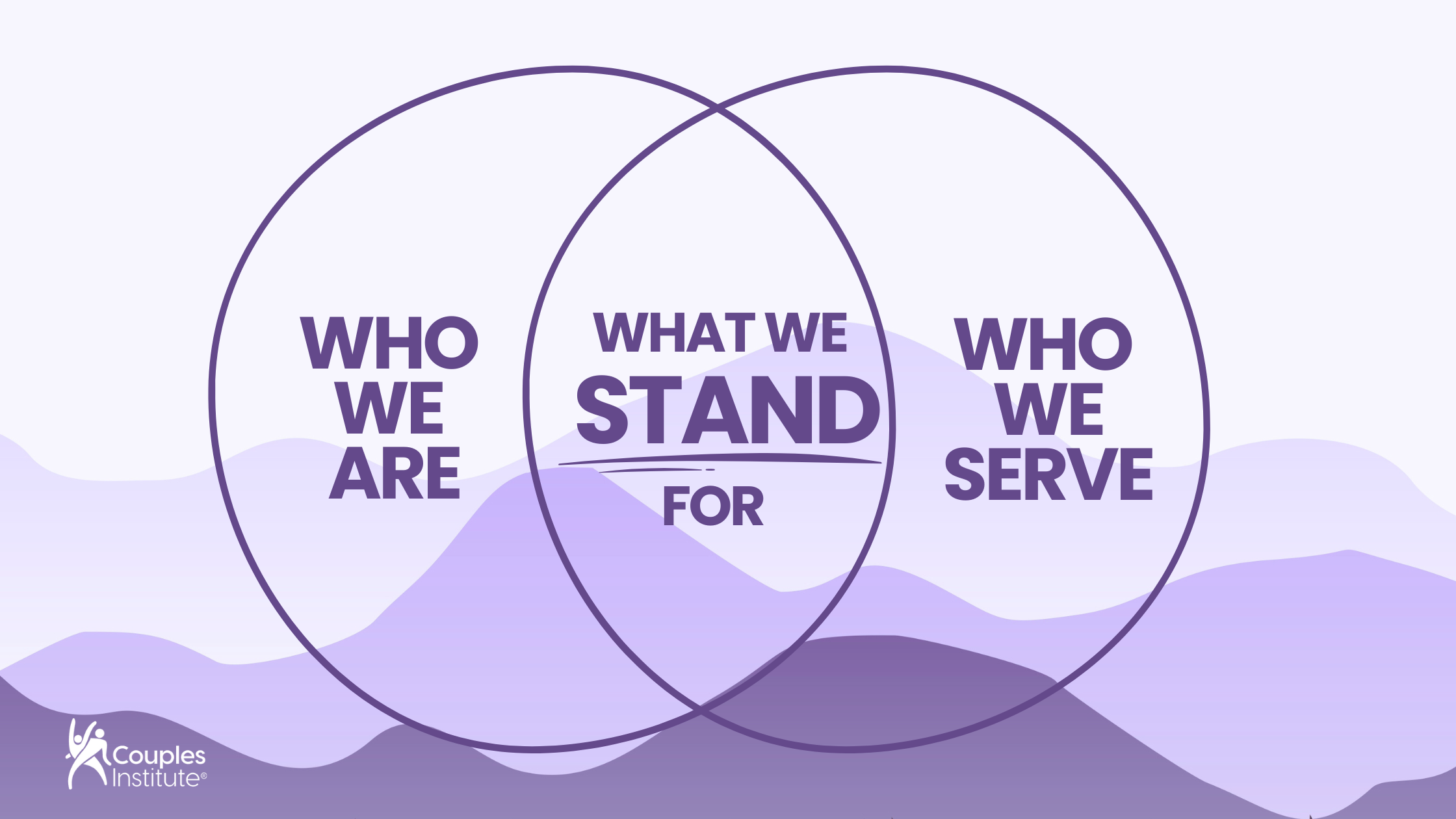
Pete and Ellyn’s Origin Story, or “How I Met Your Mother”
[Editor’s note: this love letter went to our email list on Valentine’s Day and it seemed good enough to give it a permanent home on

High-conflict, emotionally reactive couples are on the rise. In today’s charged world, many of us are seeing more couples who escalate quickly, struggle with emotional dysregulation, and arrive in therapy not to grow but to push for their partner’s change. These dynamics can easily pull clinicians off balance – especially early in treatment when patterns are being established and hope feels fragile.
I’d like to share some main points from a recent training session Katherine Wadell and I led. We outlined practical strategies for creating a strong start with these challenging couples. Here’s what we emphasized:
Before rushing to intervene, orient yourself to the developmental context of the couple. This gives you strong leverage to encourage growth. Some of these partners require very basic goals – such as identifying feelings or stating desires.
Many of these partners are stuck and don’t want to transition into the differentiation stage. They’re trying to have more of what they want while still clinging to symbiosis. Their competitive fighting is a symptom of developmental stuckness. Naming this stage and normalizing the struggle can begin to offer relief and direction.
You may repeat many times, “You are right on target for the most challenging part of a relationship: early differentiation.”
There is enormous urgency in the room with reactive couples. But you can counter that urgency with intentional slowing down. These clients often don’t know what they’re feeling or what drives their reactivity. Slowing down allows space for awareness, reflection, and the beginning of personal accountability.
Interpersonal work early on often backfires. These partners escalate, project and misinterpret rapidly when interacting. This means their time with you replicates the couple’s destructive dynamic at home and prevents the development of internal clarity. We recommended delaying direct problem-solving and focusing instead on individual self-awareness.
Katherine outlined a powerful assessment model: one extended joint session followed by two individual sessions, then a fourth session together.
With this three-part process you can:
These early individual sessions are diagnostic gold. They offer a chance to understand developmental stuck points, family-of-origin issues, and core desires that often stay hidden during partner interactions. Katherine is so committed to this structure that she says, “It might feel like a luxury, but it’s not. It’s a necessity.”
Both clients and therapists feel pressure to jump into fixing the relationship immediately. But Katherine reminds her couples, “We are not solving problems yet.” The foundation must be laid first, especially with hostile-fighting couples. Instead of resolving conflicts, the initial work will ideally help each partner articulate a vision that is motivating and clearly leads to goals for growth that is self-directed.
The degree to which each partner feels understood by the therapist determines how much they will tolerate challenge and change. That empathy must be explicit and “embellished” – especially in individual sessions – so that each person feels truly seen.
Once that connection is solid, you can begin asking the questions that foster differentiation:
These questions turn the focus inward and encourage clients to take ownership of their development.
Final Thought: Create the Conditions for Growth
Therapists working with volatile couples must resist the temptation to react or take responsibility for the couple’s change. A strong foundation anchored in developmental understanding, thorough assessment, and slowed-down structure will set the stage for powerful transformation. Your couples need to understand that you have tools, but also that they are the ones who must do the work.
That balance of leadership, empathy, and motivation is the art of early work with reactive couples. It’s not easy, but with a clear structure and the right mindset, it becomes deeply rewarding.
In our free workshop Tired, Triggered, and Traumatized: Being a Therapist in the age of Dysregulation, Ellyn will show a video clip from the training session described above. You will see how to shift the focus from partner change to individual growth and accountability. Sign up here for either September 26 or September 28.
"*" indicates required fields
 We respect your privacy.
We respect your privacy.
"*" indicates required fields
 We respect your privacy.
We respect your privacy.
[Editor’s note: this love letter went to our email list on Valentine’s Day and it seemed good enough to give it a permanent home on

As we look into the New Year, I want to share with you very clearly what Couples Institute stands for, now and always. Most of

My passion for educating couples early in their committed relationships was initially driven by personal experience. When I married at 22, my husband and I
Love your emails, resources and work you do, thankyou.
Es fenomenal ese taller para brinda puntos claves para el trabajo con parejas conflictuadas en algun punto y estancadas en algun momento de su desarrollo. Muy interesanta.
Dr. Excellent brought my husband back to me.
I almost missed this blog, but I’m glad I went back and read it.
There is some key material here that I have not done properly. That is, taking sufficient time for alliance-building and meeting each person where they are — which is often not a pretty place. It is frequently a place of enmity and resentment and reactivity. It is so hard to excavate the factors behind egregious behaviors and not look, to the offender and to their partner, like we are validating their presentation.
Instead, I had been feeling tremendous pressure to correct the offending and unproductive behaviors in joint sessions. Frankly, I was responding to my own pain and sense of failure, watching partners hurt each other and their relationship right in front of me, when my job is to make it better. Honestly, I think I misinterpreted the mandate often given in this training that I should manage and lead the session, and not let the couple run rough-shod over each other.
I had heard of the Gottman protocol of individual sessions after the first meeting, but I had not been following that because I thought they were cumbersome assessments of the problem, which I could already see playing out before me. Plus, a supervisor told me, such sessions are not recommended because they risk secrets and triangulated alliances. I did use what I call “solo” sessions at times, but not as a rule, and probably not early enough.
But I now see that the problem is often not in the behaviour the couple presents in joint sessions, it is in the individual roots of how each individual triggers each other. I was coaching them to do better, when that was not enough, or indeed counterproductive in terms of taxing my own alliance with them. Partners of course resist letting go of these defenses early on.
I am going to take more seriously what Katherine says, “(The use of individual sessions early on) might feel like a luxury, but it’s not. It’s a necessity.” She makes a great case for spending enough time to build the alliance, catalogue the attachment history, validating the pain, unearth some awareness in the individual of their offending behaviour while not risking their being shamed in front of their partner, examine motivation, and encourage the development of self-goals that can later be enacted in joint sessions.
I must say now, this all sounds like a lot more that can be done in one solo session. Yet, I think I have to risk feeling that I’m not being quick enough or productive enough, and that they will drop out without instant progress. The early progress will have to come from their sense of being properly heard.